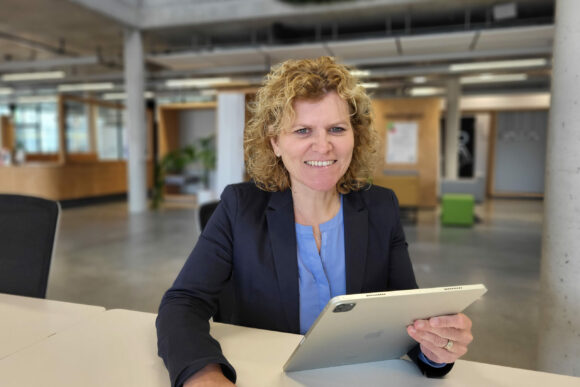Around sixty guests and a fully booked student café were recorded by the young gastronomes of Auszeit on April 10 at the first city lecture on the topic of “Bee Democracy”. “We are very pleased that it was so well received the first time around,” says a satisfied Prof. Dr. Valentin Plenk, initiator and Vice President of Hof University of Applied Sciences. “With Auszeit, we have the perfect location in the middle of the city and the topic of “Bee Democracy” has proven to be a hit.” The aim of the event series is to bring university topics closer to the citizens of Hof.

Jürgen Heym, actually a professor of networks and network technology, has been offering courses in practical beekeeping for many years, which have been enthusiastically received by students. He developed these courses out of a private interest, which also led to Hof University having its own honey. “The bees play the main role today – not me,” says Heym. In his lecture, he explained the topic of bee democracy, as the queen bee actually has less to say than the worker bees. April is currently swarming season and the bees are on the move.
Perfect honey with 18 percent water content
The speaker skillfully introduced the finer points of the bee world: He talked about the water content in honey (“With 18 percent water content, it is perfect!”), the relocation of queen bees with their swarms and the perfect bee dwelling (“They like dwellings up to a maximum of 40 liters”). He talked about researchers who set up their beehives on small islands so that they can observe the bees’ flight movements undisturbed. This involves marking 50,000 bees by hand (“Nail polish is good for marking.”). Normally, this work would be done by students.

To prevent bees from stinging: Be slow!
He also gave the audience an important tip: “Bees only see fast movements, if you make fast hand movements as a human, they sting,” said Heym. Slow movements, on the other hand, are not perceived by them, so you should simply push them away slowly with your hand, then the bees will think your hand is a wall and won’t sting.

“I had my last lecture many, many years ago, it was nice to listen to a professor again,” said one participant. Another found it very positive that the professors would come to the city center with their lectures. The guests sat at the bar, on the sofas or at tables and were a colorful mix of ages. Even some beekeepers had found their way to the Auszeit. The informal atmosphere and the student café team contributed to the successful start of the city lecture series.
Next city lecture on the topic of “Age research”
The series of city lectures will continue, the next date is May 8, again in the Auszeit and again from 5.30 pm. This time, the topic will be age research and the speaker will be Cynthia Sende, Professor of Business Psychology at Hof University of Applied Sciences. People with higher cognitive abilities are not only more successful in the education system, but also in their careers. They are less likely to live in poverty and more likely to enjoy a healthy and long life. But is high intelligence always an advantage or is it possible to be “too intelligent”? Intelligence is influenced by our genes even more than our personality. Nevertheless, we are not helplessly at the mercy of biology. What can we do to develop our mental strength in the best possible way in childhood and adolescence? What options do we have to slow down the decline in our mental capacity as we get older? She will explore these questions in her lecture.
Registrationfor the City Lecture on Ageing Research is now open here…







